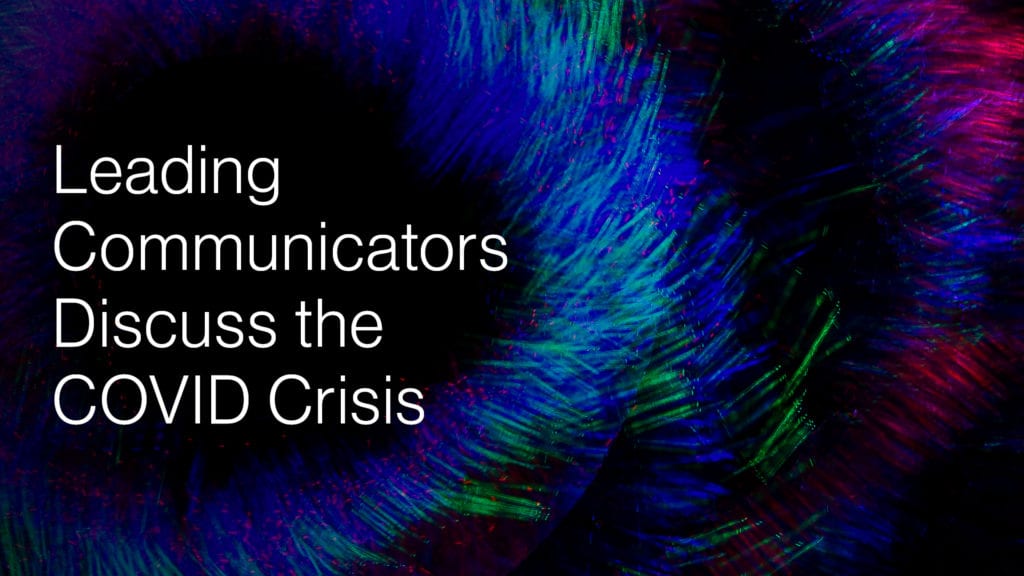This post was originally published on the Page Society blog.
I had the privilege today to moderate a discussion among more than 100 leading chief communications officers and agency leaders, all members of the Page Society. The topic was how companies are and should be responding to COVID-19.
There was broad agreement that this unprecedented situation calls for an unprecedented response. We were reminded of the words of Abraham Lincoln as his country headed into the Civil War: “The dogmas of the quiet past are inadequate to the stormy present. The occasion is piled high with difficulty and we must rise with the occasion.”

At this time we may need to think of new actions, new coalitions, even cooperation with our competitors. We need to think not only how our organizations can help to “flatten the curve” but how your company’s talent, technology and resources can help to win the fight against this disease.
One healthcare company CCO described how statements on their website and owned social channels, no matter how well composed, don’t seem to be enough in this situation. The information is too alarming, so they are creating many new ways for their stakeholders to hear from another human being, such as webcasts, conference calls and one-on-one calls. She underscored the need for more humanity in communications and the importance of “keeping it real.”
There was appreciation that people will pay attention to how companies treat their employees and customers during this time. Their actions will speak volumes about their values, priorities and ethics. We reviewed more than a dozen very recent company statements about location closures or lay-offs and admired the humanity and fairly unprecedented language in many of them.
From Danny Meyer, CEO of Union Square Hospitality Group: “Never could I have fathomed a time where the only path forward would be to lay people off so they can receive unemployment, while this company fights to see another day when we can return to our full staffing levels.”
From Philip Jansen, CEO of British Telecom, who was confirmed to have COVID-19 himself: “Having felt slightly unwell I decided as a precaution to be tested. As soon as the test results were known I isolated myself at home. I’ve met several industry partners this week so felt it was the responsible thing to do to alert them to this fact as soon as I could.”
From Rossann Williams, president of Starbucks US and Canada: “These are truly unchartered times and we’re learning right alongside you as we navigate COVID-19 together. I am proud of the swift actions we are making and you have my word and that of every leader that we will always do what’s right for you and your families, informed by science and facts.”
One CCO suggested that strong companies should be thinking beyond their own business continuity issues to help their communities and small businesses that are fighting for survival. Some companies are offering vouchers and per diems to employees working from home to be used at local delivery establishments, to support small business.
One leading academic asked the CCOs which sources of guidance or restrictive policies (no more than 50 people in one place or 200 people or 10 people, etc) are they turning to given that so many are conflicting? Which ones do you trust?
In a similar vein, a CCO commented that the long-standing tension between corporate at the center and unit leadership around the world is exacerbated by the need to communicate fast about the impact of the virus. A few CCOs said that they were allowing for more autonomy and less control from the center and encouraging geographies to communicate based on local conditions and government guidance.
Much discussion was about what’s next, what should we anticipate? Widespread furloughs and lay-offs are likely and will test reputations and relationships. One CCO commented that his company has contingency plans for an employee accident or executive death but, sadly, may need a plan for many deaths in a short period.
Such is the unprecedented and unfathomable situation we face.
We ended the call focused on the more positive prospect of recovery and what we will need to do to aid a rapid recovery. We heard about a recent comment from the author Ken Dychtwald who said he was surprised at “how little of the attention has been placed on moonshot-type solutions. We have all been confronted with a new public challenge that is a biologic enemy. Those people and technologies among us who can stop this virus in its tracks should supported in every way possible. It’s time to begin a new era of solutions: solvers needed!”
As moderator I ended the call in a way I certainly have never ended a business call before — by quoting Pope Francis from his remarks yesterday: “Tonight before falling asleep think about when we will return to the street. When we hug again, when all the shopping together will seem like a party. Think about when it will all be a memory and normality will seem an unexpected and beautiful gift. We will go back to laughing together. Strength and courage.”



